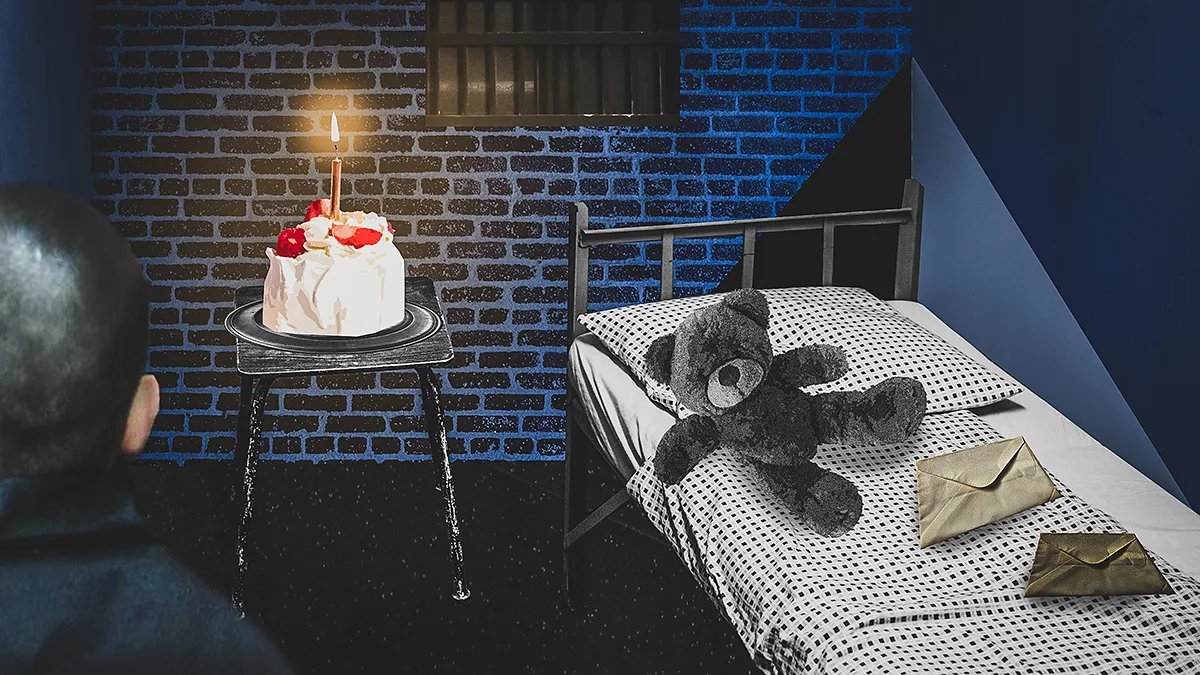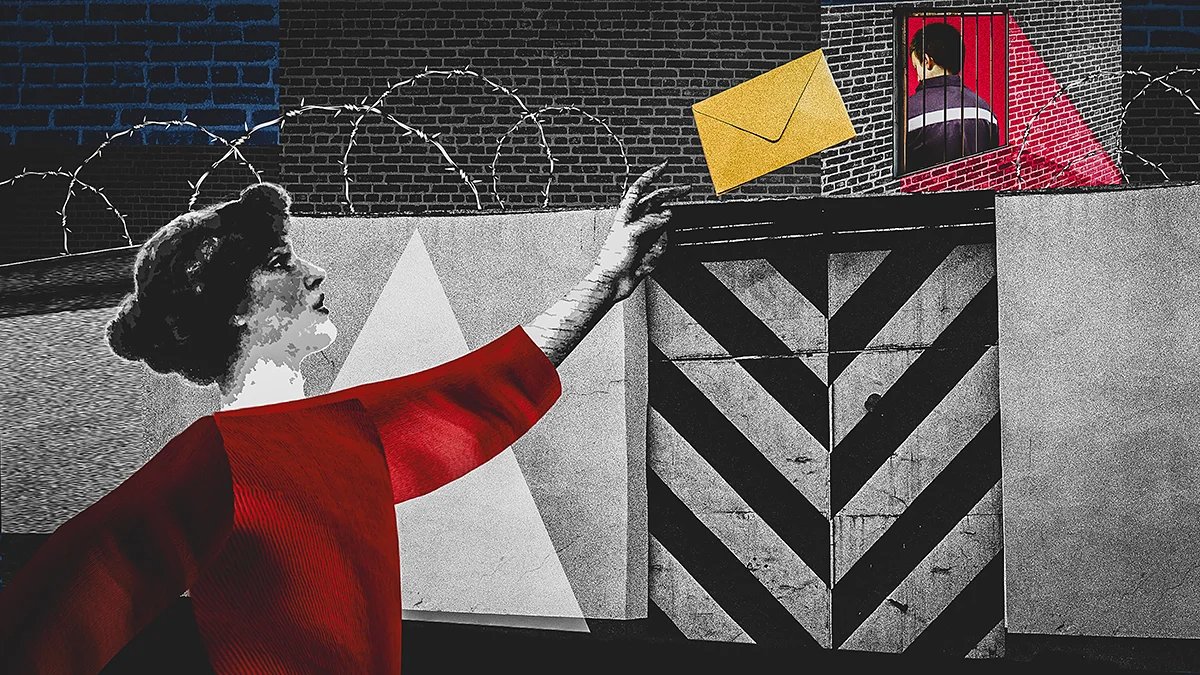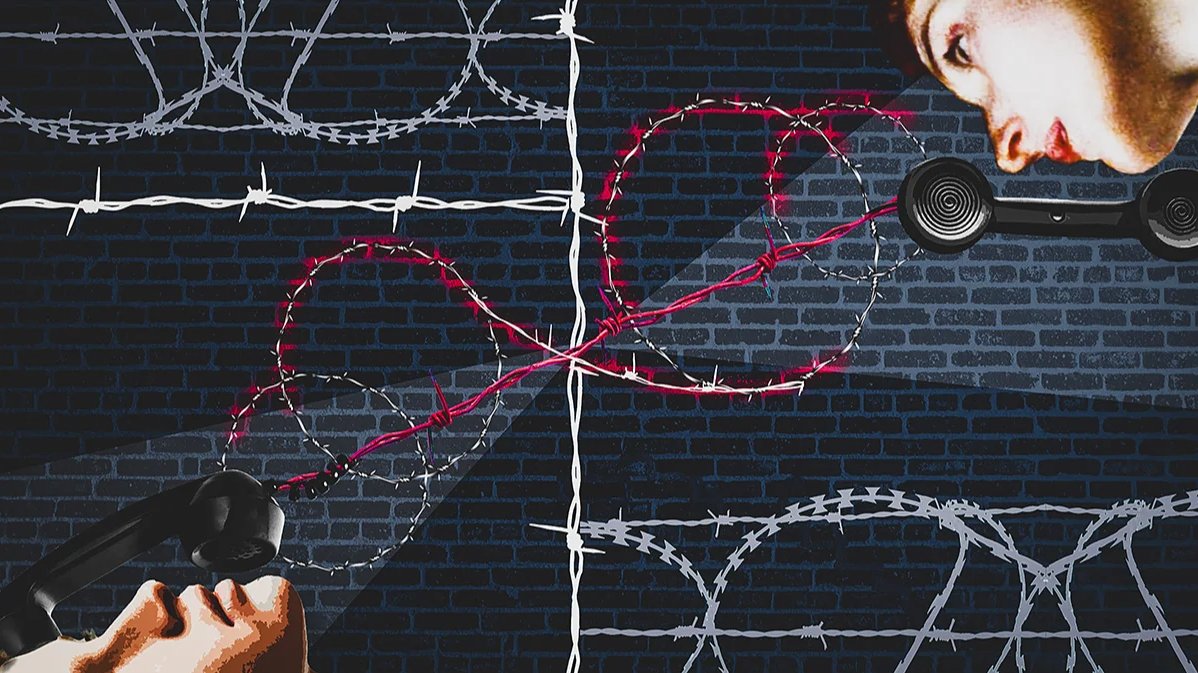Russian courts are increasingly handing minors opposed to the war in Ukraine custodial sentences, with at least 78 children being imprisoned since Russia’s full-scale invasion of Ukraine began in early 2022, according to the most recent estimates.
Minors are initially placed in pretrial detention, where they spend months awaiting their court date and sentencing, after which they are sent to young offenders institutions where they continue their education until they turn 18, when they are transferred to an adult penal colony to serve the rest of their sentence.
The crimes that minors are most often charged with in Russia these days are sabotage, committing terrorist acts, and intentionally destroying or damaging property.
‘No more holidays or birthdays’
Vera says that keeping in touch with her son Venyamin, who is currently serving a sentence in a juvenile detention centre for his anti-war views, is the biggest challenge for her. Phone calls are not permitted during the various stages of detention and so they primarily communicate via letter, but even that brings its own difficulties, as Vera’s letters frequently arrive at a facility from which he has already been transferred.
Each prison transfer begins with the new arrival being placed in quarantine, during which no communication with the outside world is possible and even lawyers are unable to reach their clients.
While being the mother of a political prisoner is difficult in many ways, Vera says the hardest part for her is the knowledge that Venyamin’s actions should not have landed him in prison.
When Vera does hear from her son, he tells her what’s been going on, what’s happening at school, and what he’s reading. For her part, Vera usually has little to say, saying she sometimes feels there’s more going on in Venyamin’s life than in her own. Indeed, she admits to feeling her life has been “put on hold” since Venyamin’s arrest, with “no more holidays, birthdays, or other positive events”. A good day, she says, is now one on which she receives no bad news.
When they are allowed to call, they are only allotted 15 minutes, which Vera described as far too short, as “it seems like he only just started talking and that’s it”.
Neither Vera nor Venyamin’s father feel that they are in a position to offer their son any advice for getting through his sentence as neither of them has ever been in prison, and the few rules Vera is aware of she sees being broken regularly by prison officers themselves.

Illustration: Novaya Gazeta Europe
Complaining would risk making things harder for him, Vera says, explaining she feels “unable to protect” her son who is “being held hostage, and the prison officers can do anything they like to him.”
Venyamin’s constant transfers have made life harder for both mother and son. At least in the pretrial detention centre where he was initially held, Vera was able to send him food parcels, toiletries and clothes. However, things in a juvenile detention centre work rather differently, and Venyamin soon asked his parents not to send him anything as it would be stolen by his fellow inmates. Instead, Vera now sends him small items he can eat on the spot.
Getting along with his peers in his current juvenile detention centre has been a struggle for Venyamin, who says he only has a couple of friends whom he trusts. While he has never fought with the other inmates, there is always a certain group of prisoners at the top of the food chain, who get away with more, follow fewer rules, and who, if necessary, can administer beatings. Things are much better for Venyamin at school where Vera reports that her son studies well and enjoys engaging with his teachers in class.
While being the mother of a political prisoner is difficult in many ways, Vera says the hardest part for her is the knowledge that Venyamin’s actions should not have landed him in prison.
Most minors who end up imprisoned for their political views come from “good prosperous families, where they were loved, respected, and had good relationships with their parents”, Vera says, adding that when they are arrested, all that simply “ceases to exist”. Before his arrest, Vera was concerned whether Venyamin would go to a good university, but now she only cares that he remains unharmed.
Venyamin celebrated his first birthday behind bars while awaiting his sentence. Other holidays have lost all meaning for the family; the only dates in their calendar are those of Venyamin’s arrest and sentencing. His father literally counts the days that Venyamin has spent behind bars.

Illustration: Novaya Gazeta Europe
Vera’s message to the other parents of political prisoners is simple: don’t place any trust in the legal system, courts, appeals or cassation to provide justice and be wary of having too much hope, which she says “just knocks you out of rhythm”.
Venyamin’s release date will be the end point for the family’s suffering, Vera says, adding that she will keep on going by reminding herself that she “needs to live to reach this end goal, to be there to meet him when he walks out of prison”.
‘Nobody cares what becomes of these children’
“I live in constant fear for the life of my child, and feel completely helpless,” says Nadezhda, the mother of political prisoner Platon. “Ever since they opened the criminal case, I’ve tried to do whatever I can to stop this madness.”
Nadezhda began fighting to defend her son as soon as he was arrested. She complained to the Prosecutor General’s Office, Vladimir Putin, the head of Russia’s Investigative Committee, and elsewhere, but all her letters were redirected to her local city council, and she received only pro forma replies.
“Every adult involved in my son’s case couldn’t care less that a child’s life and his future is at stake. I don’t have a moment’s peace. I can’t quell that inner pain with work, reading or sport. I just can’t, no matter how hard I try.”

Illustration: Novaya Gazeta Europe
She says she had a very warm relationship with her son and that they got on well. They would discuss how things were going at school, and he would say what he had read and learned in class. Even now, Nadezhda can often sense when something is wrong with her son. When she does, she calls the detention centre where he is being held, but the prison officer always tells her that her son is fine. Yet in his letters, Platon often speaks of his poor physical and mental health.
“Will I ever be able to forgive these people? I won’t,” Nadezhda says. “Do I want them to feel this pain, realise what it means to lose the people most dear and close to you? Yes, I do. I am a normal person, not a saint. I can’t forgive everything. I want these people to feel what I’m feeling now, and for them to be punished in accordance with the law. They’ve taken away the most precious thing I had in my life!”
She says the whole trial was a farce from the very beginning. The charges were trumped up. “Information known to be false” was submitted to the court, and the investigators were changed in the course of the case. “It’s very difficult when you live with the belief that common sense will prevail, and it doesn’t,” says Nadezhda.
She tries to remind her son in every letter that anything might happen, and it makes sense to be prepared in good time to expect a guilty verdict and for him to be sent to a penal colony. It is, however, not possible to maintain regular communication. Nadezhda says the 15-minute phone calls are not enough and she and her son don’t even get to say goodbye. Despite being locked up, Platon remains interested in news from the outside world.
“I ask what food to order for him, how things are at school, how he feels. He answers, and then asks me how the elections went in Moldova, and what’s happening in the US. He always asks me to look at the news and tell him what’s going on,” she says.
Platon does not complain about prison school. In fact, he says the teachers treat everyone well and try to get through the whole curriculum, although there are just two or three lessons a day.
“The hardest thing is probably going to bed, because I’m overcome by this insane anxiety. I can’t even read. I just sit in his room, looking at his photographs and schoolbooks, his backpack next to his desk.”
Handing over parcels tends to go smoothly these days, as she now knows exactly how to prepare them, and she was even able to order cake and sweets on Platon’s birthday so that he could celebrate the occasion with his friends.
Platon writes to his mother that he tries to shore himself up by thinking of her when he is down. While for Nadezhda every day seems to be the same.
“I get up early and think about how my son is doing in there,” she says. “I try to stay positive. I go to work, which is a distraction, and discuss matters with the lawyers. I come home. The hardest thing is probably going to bed, because I’m overcome by this insane anxiety. I can’t even read. I just sit in his room, looking at his photographs and schoolbooks, his backpack next to his desk. And I say to myself: ‘Don’t worry. It’ll still come in handy. This will all be over soon.’”
A lot of people don’t want to know too much about what happened to Platon. Some don’t believe in such a thing as trumped up charges, and say there’s no smoke without fire. “I’ve learnt to ignore it,” Nadezhda says. “Time has taught me to set priorities and save my energy for myself, not waste it.”
Join us in rebuilding Novaya Gazeta Europe
The Russian government has banned independent media. We were forced to leave our country in order to keep doing our job, telling our readers about what is going on Russia, Ukraine and Europe.
We will continue fighting against warfare and dictatorship. We believe that freedom of speech is the most efficient antidote against tyranny. Support us financially to help us fight for peace and freedom.
By clicking the Support button, you agree to the processing of your personal data.
To cancel a regular donation, please write to [email protected]

